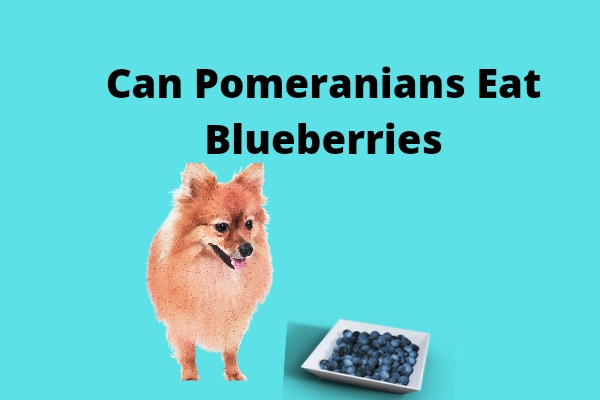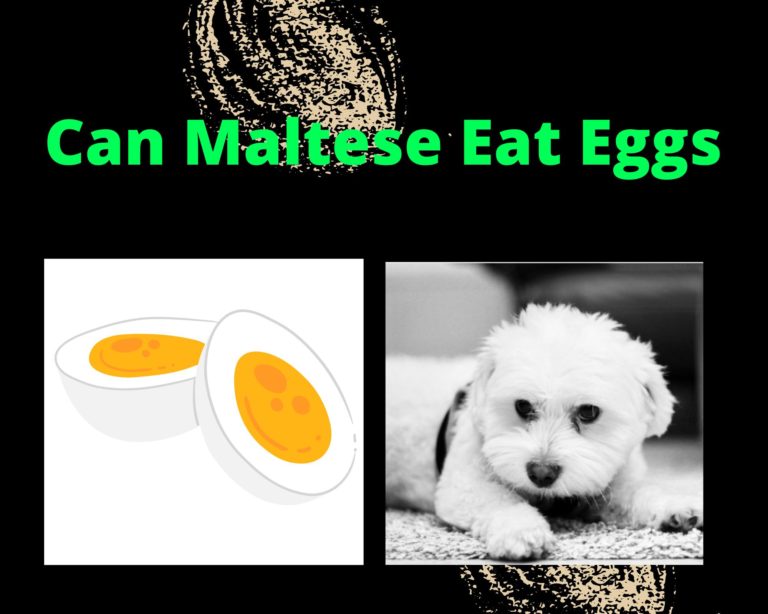49 Safe Human Foods Dogs Can Eat You Can Try

Hey there, fellow dog parents! Today, let’s dive into the fascinating world of human foods dogs can eat in moderation.
From crunchy carrots to succulent salmon, we’ll explore some safe and healthy treats that will have your pup’s tail wagging with delight.
So, grab a seat, and let’s embark on this culinary adventure together!
Human Foods Dogs Can Eat
Dogs can safely enjoy a variety of human foods, but it’s important to be mindful of their nutritional needs.
Some dog-friendly options include lean meats like chicken and turkey, as well as vegetables like carrots and green beans. Fruits such as apples and blueberries can also be given in moderation.
However, it’s crucial to avoid feeding dogs chocolate, grapes, onions, and foods high in salt or artificial sweeteners, as these foods can be toxic to dogs.
Let’s dive deeper for a better understanding… Starting with fruits and vegetables!
Human Fruits and Vegetables Dogs Can Eat
The following are some human fruits and vegetables dogs can eat:
1. Watermelon
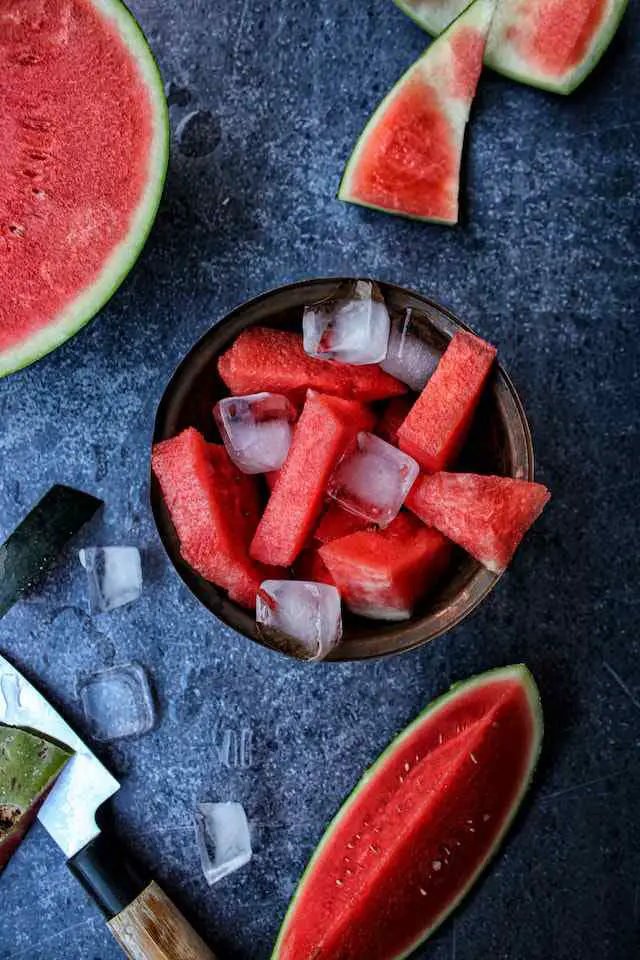
Watermelon can be a safe and healthy treat for dogs. It is low in calories and fat, making it a refreshing option for dogs with weight management issues.
Watermelon is also high in vitamins A and C, which can support a dog’s immune system. To feed watermelon to dogs, remove the seeds and rind, as they can be difficult to digest.
Offer small, bite-sized pieces to prevent choking hazards. Always introduce watermelon gradually and in moderation to ensure your dog tolerates it well.
2. Apples
Apples are a safe and healthy fruit for dogs to consume. They are a great source of vitamins A and C, fiber, and antioxidants.
Apples can help support a dog’s immune system, promote healthy digestion, and improve dental health. To feed apples to dogs, it is important to remove the seeds and core as they can be a choking hazard.
Sliced or chopped apples can be given as a treat or mixed into their regular food in moderation. Remember to introduce apples gradually to ensure your dog tolerates them well.
3. Blueberries
Blueberries are a safe and nutritious fruit that dogs can enjoy as part of their diet. They are low in calories and high in fiber, making them a healthy snack option.
Blueberries are also packed with antioxidants, which can help boost a dog’s immune system and promote overall wellness.
To feed blueberries to dogs, it’s best to serve them in moderation as treats or mix them with their regular food.
Before introducing any new food to a dog’s diet, it’s important to consult with a veterinarian to ensure it’s suitable for their specific needs.
4. Carrots
Carrots are a safe and healthy addition to a dog’s diet. They are low in calories and high in fiber, making them a great choice for weight management.
Carrots are also rich in vitamins A, B, and K, which promote good eyesight, a healthy coat, and overall immune function in dogs.
To feed carrots to dogs, they can be served raw as a crunchy snack or cooked and mashed as a tasty addition to their regular meals.
It’s important to cut carrots into bite-sized pieces to avoid choking hazards, and always introduce new foods gradually to monitor for any digestive issues.
5. Cantaloupe
Cantaloupe is a safe and healthy fruit that dogs can enjoy as part of their diet. It is high in vitamins A and C, which support immune function and promote healthy skin and coat. Cantaloupe is also a good source of dietary fiber, aiding in digestion.
To feed cantaloupe to dogs, it is important to remove the seeds and rind, as they can be difficult to digest and may pose a choking hazard.
Serving small, bite-sized pieces of ripe cantaloupe as an occasional treat is a great way to incorporate this nutritious fruit into a dog’s diet.
6. Peas
Peas can be a nutritious addition to a dog’s diet as they are rich in vitamins, minerals, and fiber.
They provide a good source of protein, which is essential for muscle development and overall health.
Additionally, peas are low in fat and calories, making them a healthy option for weight management.
To feed peas to dogs, they can be cooked or steamed to improve digestibility. It is important to serve peas in moderation as too much can cause digestive upset.
7. Bananas
Bananas can be a healthy addition to a dog’s diet as they are packed with essential nutrients.
They are a good source of potassium, vitamin C, and vitamin B6, which promote heart health, boost the immune system, and support brain function.
To feed bananas to dogs, it is best to serve them in small, bite-sized pieces to prevent choking hazards. It is important to remove the peel before offering bananas to dogs.
Moderation is key, as bananas should be given as an occasional treat and not as a substitute for a balanced canine diet.
8. Mango
Mango is a safe and healthy fruit that dogs can enjoy as part of their diet. It is rich in vitamins A, C, and E, which promote a strong immune system and healthy skin. Additionally, mango contains dietary fiber, which aids in digestion.
To feed mango to dogs, it is important to remove the skin, pit, and any potential choking hazards.
It can be given to dogs in small, bite-sized pieces as a treat or mixed into their regular meals.
As with any new food, it is recommended to introduce mango gradually to monitor for any potential allergies or digestive issues.
9. Green beans
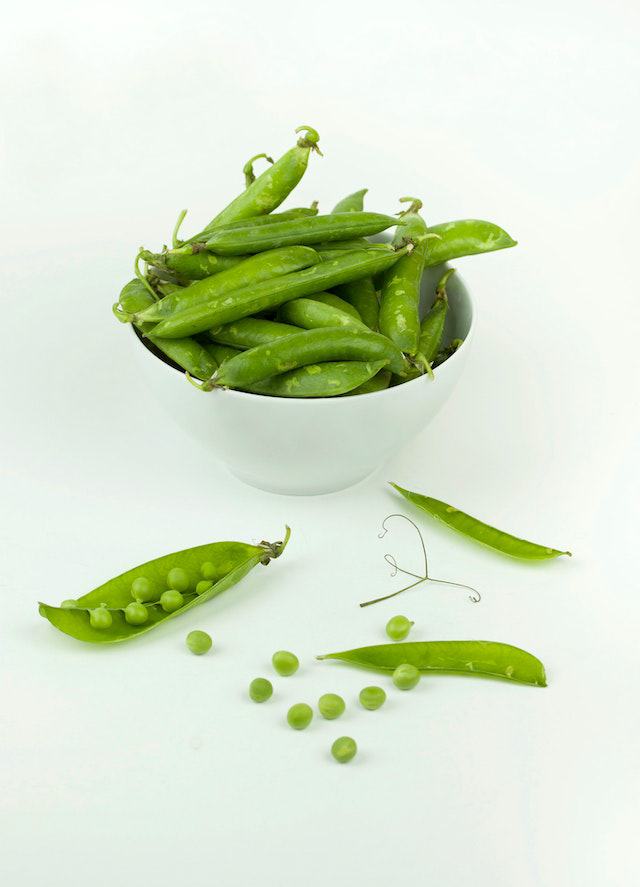
Green beans are a safe and healthy human food that dogs can enjoy. They offer several benefits, including being low in calories and high in fiber, which can aid in weight management and digestive health for dogs.
Green beans are also a good source of vitamins and minerals, such as vitamin C and potassium.
To feed green beans to dogs, they should be cooked and served plain, without any seasonings or additives.
Dogs can be given green beans as a treat or mixed into their regular meals to add some variety and nutritional value to their diet.
10. Pineapple
Pineapple can be a healthy addition to a dog’s diet as it is low in calories and high in nutrients. It is a good source of vitamins C and B6, as well as dietary fiber.
Pineapple also contains bromelain, an enzyme that aids digestion and reduces inflammation.
To feed pineapple to dogs, it is best to remove the tough outer skin and core, and then chop it into small, manageable pieces.
Moderation is key, and it is recommended to introduce pineapple gradually into a dog’s diet to avoid digestive issues.
11. Pumpkin
Pumpkin is a nutritious addition to a dog’s diet as it provides several benefits. Firstly, it is high in fiber, which aids digestion and can help with both constipation and diarrhea.
Secondly, pumpkin is low in calories, making it a great option for dogs on a weight management plan. Additionally, it is rich in vitamins A, C, and E, promoting a healthy immune system.
To feed pumpkin to dogs, it is recommended to start with small portions and gradually increase the amount. It is best to offer plain, cooked, and pureed pumpkins without any added sugars or spices.
12. Cucumbers
Cucumbers can be a safe and healthy addition to a dog’s diet. They are low in calories and contain high water content, making them a hydrating snack for dogs.
Cucumbers are also a good source of vitamins K, C, and B1, as well as minerals like magnesium and potassium.
To feed cucumbers to dogs, it’s important to remove the seeds as they can be difficult for dogs to digest.
Sliced cucumbers can be given as treats or added to your dog’s food for a refreshing and nutritious boost. Remember to introduce new foods gradually and in moderation to avoid any digestive issues.
13. Spinach
Spinach is a safe and nutritious human food that can be included in a dog’s diet. It is packed with vitamins A, C, and K, as well as iron, calcium, and fiber, making it beneficial for dogs.
The leafy green vegetable promotes healthy digestion, boosts the immune system, and helps maintain strong bones.
To feed spinach to dogs, it is important to cook it thoroughly to break down oxalic acid, which can be harmful in large quantities.
Serve spinach in small amounts as a treat or mix it with your dog’s regular food for added nutrition.
14. Blackberries
Blackberries are a safe and healthy fruit that dogs can enjoy as part of their diet. They are packed with vitamins, minerals, and antioxidants that can support a dog’s overall health.
The benefits of feeding blackberries to dogs include promoting healthy digestion, boosting the immune system, and providing a natural source of fiber.
To feed blackberries to dogs, it’s important to first wash them thoroughly and remove any stems or leaves.
Then, you can offer a few blackberries as a treat or mix them into your dog’s regular food for added nutrition. Remember to introduce new foods gradually and in moderation to avoid any digestive upset.
15. Broccoli
Broccoli is a safe and healthy vegetable that dogs can eat in moderation. It is a good source of vitamins, minerals, and fiber, which can support their overall health.
The benefits of feeding broccoli to dogs include improved digestion, strengthened immune system, and potential cancer-fighting properties.
To feed broccoli to dogs, it is important to cook it thoroughly to make it easier to digest and avoid any potential digestive issues.
Offer small, bite-sized pieces as a treat or mix it with their regular food to add variety and nutritional value to their diet.
16. Strawberries
Strawberries are a safe and healthy fruit that dogs can eat in moderation. They are packed with essential nutrients like vitamins C and K, fiber, and antioxidants.
The benefits of feeding strawberries to dogs include improved digestion, a boosted immune system, and potential anti-inflammatory effects.
To feed strawberries to dogs, it is important to wash them thoroughly, remove the stems and leaves, and cut them into small, bite-sized pieces.
Serve strawberries as an occasional treat, considering your dog’s size and any specific dietary restrictions.
17. Raspberries
Raspberries can be a healthy addition to a dog’s diet as they are low in calories and high in fiber, vitamins, and antioxidants.
The high fiber content promotes healthy digestion, while the antioxidants help boost the immune system.
To feed raspberries to dogs, it is important to wash them thoroughly and remove any stems or leaves.
It is recommended to introduce raspberries slowly into a dog’s diet to avoid any digestive upset, starting with small amounts and gradually increasing.
18. Tangerines
Tangerines, a citrus fruit, can be a healthy addition to a dog’s diet. They are rich in vitamins A, C, and B6, as well as fiber. These nutrients can support a dog’s immune system, promote healthy digestion, and contribute to overall well-being.
When feeding tangerines to dogs, it’s important to remove the peel and seeds, as they can be difficult to digest and may pose a choking hazard.
It’s best to serve tangerines in small, bite-sized pieces as an occasional treat or mix them into your dog’s regular food for added flavor and nutritional benefits.
19. Peaches
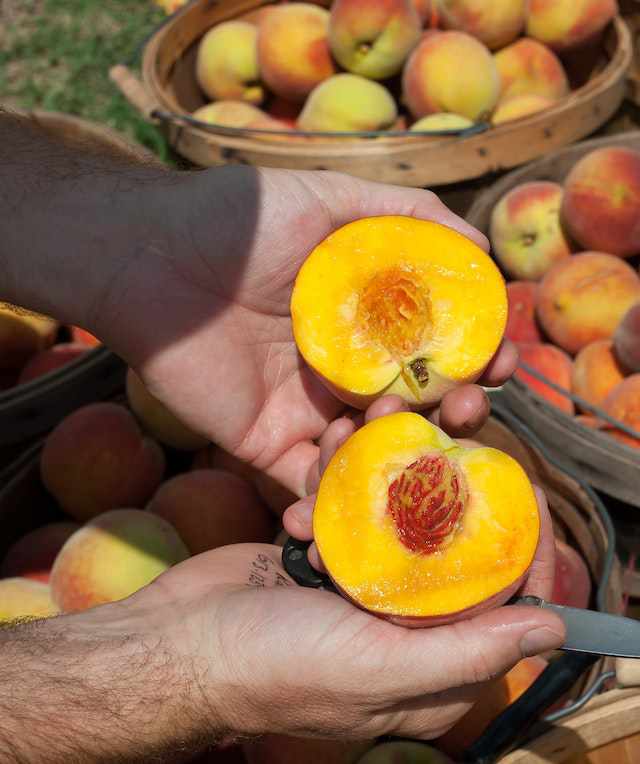
Peaches can be a healthy addition to a dog’s diet as they are packed with vitamins A and C, fiber, and antioxidants.
The benefits of feeding peaches to dogs include promoting a healthy immune system, aiding digestion, and supporting eye health.
To feed peaches to dogs, it is important to remove the pit, as it contains small amounts of cyanide that can be harmful.
The best way to feed peaches to dogs is to slice them into small, bite-sized pieces and offer them as a treat or mix them into their regular food. Remember to introduce peaches gradually and monitor your dog’s reaction for any signs of sensitivity or allergies.
20. Kiwis
Kiwis can be a healthy and nutritious addition to a dog’s diet. They are a good source of vitamin C, fiber, and antioxidants. Kiwis can help support a dog’s immune system, improve digestion, and promote healthy skin and coat.
To feed kiwis to dogs, start by removing the skin and seeds, as they can be a choking hazard.
Cut the kiwi into small, bite-sized pieces and offer it to your dog as a treat or mix it into their regular food. Remember to introduce new foods gradually and in moderation to avoid any digestive upset.
21. Oranges
Oranges can be a healthy addition to a dog’s diet as they are rich in vitamins and minerals. They contain vitamin C, which supports immune function and can help prevent cell damage.
Oranges also provide fiber, which aids in digestion and can help regulate bowel movements. To feed oranges to dogs, it is important to remove the peel and seeds, as these can be difficult for dogs to digest.
It is best to offer small, bite-sized pieces of orange as an occasional treat, taking into consideration your dog’s individual dietary needs and any potential allergies.
22. Brussel Sprouts
Brussels sprouts are safe for dogs to eat and can provide several health benefits. They are rich in vitamins A, C, and K, as well as fiber and antioxidants.
These nutrients can support a dog’s immune system, promote healthy digestion, and contribute to overall well-being.
To feed Brussels sprouts to dogs, it is recommended to cook or steam them to enhance digestibility. It is important to serve them in small, bite-sized pieces and avoid seasoning or adding any harmful ingredients.
As with any new food, it’s advisable to introduce Brussels sprouts gradually and monitor your dog for any adverse reactions.
23. Kale
Kale is a nutrient-dense leafy green vegetable that can be a healthy addition to a dog’s diet. It is rich in vitamins A, C, and K, as well as minerals like calcium and iron.
These nutrients can support a dog’s immune system, bone health, and overall well-being. However, it’s important to feed kale to dogs in moderation as excessive amounts can cause digestive issues.
To introduce kale to a dog’s diet, it should be washed thoroughly, steamed, or boiled to make it easier to digest, and then chopped into small, manageable pieces.
Mixing it with their regular food or using it as a healthy treat option can be a great way to incorporate kale into a dog’s diet.
24. Tomatoes

Tomatoes can be a safe and healthy addition to a dog’s diet when fed in moderation. They are low in calories and high in vitamins A and C, as well as antioxidants.
However, it’s important to note that the leaves and stems of the tomato plant contain a toxic substance called solanine, so only the ripe fruit should be given to dogs.
To feed tomatoes to dogs, it’s best to remove the green parts, seeds, and core, as they can cause digestive issues.
25. Pears
Pears can be a healthy addition to a dog’s diet as they are packed with essential nutrients. They are a good source of fiber, which aids in digestion and can help regulate bowel movements.
Pears also contain vitamins C and K, as well as potassium, which supports heart health. To feed pears to your dog, make sure to remove the seeds and core, as they can be a choking hazard.
Slice the pear into small, bite-sized pieces and offer it as a treat, or mix it into your dog’s regular food in moderation.
26. Corn
Corn is a safe and nutritious food that dogs can enjoy in moderation. It is a good source of carbohydrates, fiber, and essential vitamins and minerals. Corn can provide energy for dogs and aid in digestion.
To feed corn to dogs, it is best to cook or steam it and remove it from the cob. It can then be served as a small side dish or added to their regular dog food.
However, it is important to remember that corn should not be the main component of a dog’s diet and should be given in moderation to avoid digestive issues.
27. Zucchini
Zucchini is a safe and healthy human food that dogs can enjoy. It is low in calories and contains essential vitamins and minerals such as vitamin C and potassium.
The high fiber content in zucchini can aid in digestion and promote a healthy weight.
To feed zucchini to dogs, it’s best to cook it thoroughly to enhance nutrient absorption and avoid any potential digestive issues.
You can serve it boiled, steamed, or even pureed as a tasty and nutritious addition to their regular meals.
Other Human Foods Dogs Can Eat
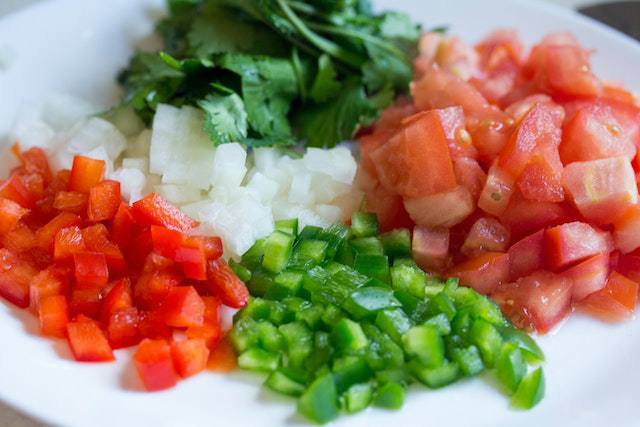
The following are other types of human foods dogs can eat:
1. Plain Yogurt
Plain yogurt can be a healthy addition to a dog’s diet. It is a good source of protein, calcium, and probiotics, which can promote digestive health.
When feeding yogurt to dogs, it is important to choose plain, unsweetened varieties without any added flavors or sweeteners.
Start by introducing small amounts of yogurt into your dog’s diet to ensure they tolerate it well. You can mix yogurt with their regular food or serve it as a treat or topper.
2. Oatmeal
Oatmeal is a safe and nutritious human food that can be given to dogs. It is a great source of fiber, which aids in digestion and helps regulate bowel movements.
Additionally, oatmeal is rich in vitamins and minerals, such as iron and B vitamins, which are beneficial for a dog’s overall health.
To feed oatmeal to dogs, it is important to cook it thoroughly and avoid adding any sweeteners or artificial additives. Start with small portions and monitor your dog’s reaction to ensure there are no adverse effects.
3. Quinoa
Quinoa is a nutritious grain that can be safely consumed by dogs. It is a great source of protein, fiber, and essential minerals such as magnesium and iron.
Quinoa is also gluten-free, making it suitable for dogs with sensitivities or allergies. To feed quinoa to dogs, it should be cooked thoroughly and served in moderation as a part of a balanced diet.
It can be mixed with their regular food or served as a side dish, but it’s important to avoid adding any seasonings or ingredients that may be harmful to dogs.
4. Honey
Honey can be a safe and healthy addition to a dog’s diet. It provides numerous benefits, including being a natural source of vitamins and minerals, boosting the immune system, and aiding digestion.
When feeding honey to dogs, it’s important to do so in moderation due to its high sugar content. Start by introducing small amounts and gradually increase as tolerated.
5. Cooked Rice
Cooked rice can be a safe and healthy addition to a dog’s diet. It is easily digestible and can provide a source of carbohydrates for energy.
Additionally, rice is low in fat and can be a good option for dogs with sensitive stomachs or dietary restrictions. To feed cooked rice to dogs, it is important to ensure that it is plain and unseasoned, without any added spices or oils.
It is recommended to serve it in small portions mixed with their regular dog food, to avoid any sudden dietary changes that could upset their stomach.
6. Bread
Bread, without raisins or other toxic ingredients, can be a safe and occasional treat for dogs. It can provide carbohydrates for energy and some essential nutrients.
When feeding bread to dogs, it’s important to do so in moderation due to its high-calorie content.
It’s best to choose whole grain bread over white bread, as it contains more fiber and nutrients.
To feed bread to dogs, it should be cut into small, bite-sized pieces and given as an occasional snack, alongside a balanced diet.
7. Popcorn

Popcorn can be a safe and enjoyable treat for dogs when prepared correctly. It is low in calories and fat, making it a healthier alternative to many other snacks.
However, it is important to note that plain, air-popped popcorn is the best option for dogs, as flavored or seasoned varieties can contain harmful additives like salt, butter, or artificial flavorings.
To feed popcorn to dogs, ensure it is fully popped and remove any unpopped kernels that could pose a choking hazard.
Popcorn can be given in moderation as an occasional treat, but it should never replace a balanced diet or be the sole source of nutrition for dogs.
8. Peanut butter
Peanut butter can be a healthy and tasty addition to a dog’s diet. It is a good source of protein, healthy fats, and vitamins like vitamin E and vitamin B.
The benefits of feeding dogs peanut butter include providing energy, promoting a healthy coat, and supporting their immune system.
When feeding peanut butter to dogs, it is important to choose a brand that does not contain artificial sweeteners like xylitol, which can be toxic to dogs.
Peanut butter can be given to dogs in moderation, either as a treat or as a filling for interactive toys like Kong.
9. Cooked Potatoes
Cooked potatoes can be a safe and healthy addition to a dog’s diet. They are a good source of vitamins and minerals, such as vitamin C and potassium.
However, it’s important to note that potatoes should always be cooked thoroughly before feeding them to dogs, as raw potatoes can be toxic to them.
To feed cooked potatoes to dogs, it’s best to cut them into small, bite-sized pieces and mix them with their regular food.
Moderation is key, as feeding too many potatoes can lead to weight gain or digestive issues.
10. Cashews
Cashews can be a safe and nutritious treat for dogs when given in moderation. They are a good source of healthy fats, protein, and essential minerals like magnesium and phosphorus.
Cashews can contribute to a dog’s overall health by supporting their immune system and promoting healthy skin and coat.
To feed cashews to dogs, it is important to ensure they are unsalted and preferably roasted to enhance digestibility.
It is recommended to chop or crush cashews into smaller pieces before offering them as a treat or mixing them with your dog’s regular food.
11. Coconut
Coconut is a safe and nutritious food option for dogs. It is rich in healthy fats, fiber, and essential vitamins and minerals.
The benefits of coconut for dogs include promoting healthy skin and coat, aiding in digestion, and boosting immune function.
To feed coconut to dogs, start with small amounts and gradually increase the serving size. It can be given as a treat or added to their regular meals.
However, it is important to remove the husk and shell before feeding coconut to dogs, as they can be difficult to digest.
12. Peanuts
Peanuts can be a safe and nutritious addition to a dog’s diet. They are a good source of healthy fats, protein, and vitamins, such as vitamin E.
However, it is important to feed peanuts to dogs in moderation due to their high fat content.
To incorporate peanuts into a dog’s diet, they can be given as a treat or mixed with their regular food.
It is crucial to ensure that the peanuts are unsalted and unsweetened, as added salt and sugar can be harmful to dogs.
13. Eggs
Eggs are a safe and nutritious addition to a dog’s diet. They are an excellent source of high-quality protein, vitamins, and minerals.
The benefits of feeding eggs to dogs include promoting muscle growth and maintenance, supporting a healthy coat, and boosting the immune system.
To feed eggs to dogs, they should be cooked thoroughly to avoid the risk of salmonella contamination.
It is recommended to start with small portions and gradually increase the amount, depending on the dog’s size and dietary needs.
Different Types of Meat Dogs Can Eat

The following are some types of meat dogs can eat:
1. Chicken
Pork can be a suitable part of a dog’s diet as it is a good source of protein, vitamins, and minerals. It provides essential amino acids that help support muscle growth and repair.
When feeding pork to dogs, it is important to ensure it is cooked thoroughly to eliminate any potential bacteria or parasites.
Avoid seasoning the pork with ingredients like garlic or onions, as they can be toxic to dogs.
Moderation is key, as pork can be high in fat, which may lead to digestive issues or weight gain if overfed.
2. Turkey
Turkey is a human food that dogs can safely consume. It offers several benefits, such as being a lean source of protein, rich in essential amino acids, and containing vitamins B6 and B12.
To feed turkey to dogs, it is important to remove the skin, bones, and excess fat to avoid digestive issues.
Cooked plain turkey without seasoning or spices is recommended, and it can be served in small portions as a treat or mixed with the dog’s regular food for added flavor and nutrients.
3. Pork
Pork can be a suitable part of a dog’s diet as it is a good source of protein, vitamins, and minerals. It provides essential amino acids that help support muscle growth and repair.
When feeding pork to dogs, it is important to ensure it is cooked thoroughly to eliminate any potential bacteria or parasites.
Avoid seasoning the pork with ingredients like garlic or onions, as they can be toxic to dogs.
Moderation is key, as pork can be high in fat, which may lead to digestive issues or weight gain if overfed.
4. Beef
Beef is a nutritious protein source that can be a part of a dog’s diet. It provides essential amino acids that contribute to muscle development and overall health.
When feeding beef to dogs, it is important to choose lean cuts to avoid excess fat intake. It is recommended to cook beef thoroughly to eliminate any potential bacteria or parasites.
To ensure a balanced diet, beef should be served in moderation alongside other dog-friendly foods like vegetables and grains.
5. Tuna
Tuna can be a nutritious addition to a dog’s diet. It is a good source of protein, omega-3 fatty acids, and essential vitamins and minerals.
These nutrients promote healthy skin and coat, support brain function, and boost the immune system.
When feeding tuna to dogs, it is important to choose low-sodium varieties and avoid seasoning or additives.
It is recommended to offer tuna as an occasional treat or mixed with their regular dog food to ensure a balanced diet.
6. Salmon
Salmon is a nutritious food that can be included in a dog’s diet. It is an excellent source of omega-3 fatty acids, which promote healthy skin and coat, support joint health, and boost the immune system.
To feed salmon to dogs, it is important to cook it thoroughly to eliminate any potential parasites or bacteria.
Remove the skin and bones before serving, as they can pose a choking hazard.
Finally, serve the salmon in small portions as an occasional treat or mix it with your dog’s regular food for added variety and nutritional benefits.
7. Shrimp

Shrimp is a nutritious addition to a dog’s diet. It is a low-calorie protein source that can support muscle development.
Shrimp is also rich in omega-3 fatty acids, which promote healthy skin and coat.
To feed shrimp to dogs, it is important to remove the shell, tail, and digestive tract to prevent any potential choking hazards.
It is recommended to cook the shrimp thoroughly and serve it in small, bite-sized portions as a treat or mixed with your dog’s regular food.
8. Rabbit
Rabbit can be a healthy addition to a dog’s diet, as it is a lean source of protein and contains essential nutrients. It is rich in vitamins B12 and B3, which support brain function and energy metabolism.
Rabbit meat also provides minerals like iron and zinc, which promote immune health and aid in tissue repair.
When feeding rabbit meat to dogs, it is important to cook it thoroughly to eliminate any potential parasites or bacteria.
Serve it in small, bite-sized portions, and gradually introduce it to your dog’s diet to ensure they tolerate it well.
9. Duck
Duck is a nutritious and safe protein source that dogs can enjoy as part of their diet. It is rich in essential amino acids, vitamins, and minerals, making it a healthy choice for dogs.
Duck provides high-quality protein for muscle development and maintenance. It also contains omega-3 fatty acids, which support a healthy coat and skin.
To feed duck to dogs, it is recommended to cook it thoroughly without seasoning or added ingredients and to remove any bones before serving.
Introducing duck gradually and monitoring your dog’s response is important to ensure it agrees with their digestive system.
Conclusion
In conclusion, it’s important to remember that while some human foods can be shared with our furry friends, not all foods are safe for dogs.
Always consult with your veterinarian before introducing new foods into your dog’s diet.
With a little research and caution, you can treat your pup to some tasty and healthy snacks!

